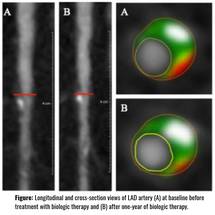Biologics May Reduce Plaque Buildup in Psoriasis Patients' Arteries

Treating psoriasis with biologic drugs can reduce the early plaque buildup that clogs arteries, restricts blood flow, and leads to heart attacks and stroke, according to a study funded by the National Heart, Lung, and Blood Institute (NHLBI) that appears online today in the journal Cardiovascular Research.
“Classically a heart attack is caused by one of five risk factors: diabetes, hypertension, high cholesterol, family history, or smoking,” says Nehal N. Mehta, M.D., head of the Lab of Inflammation and Cardiometabolic Diseases at NHLBI, in a news release. “Our study presents evidence that there is a sixth factor, inflammation; and that it is critical to both the development and the progression of atherosclerosis to heart attack.”
Now researchers provided first in-human evidence that treatment of a known inflammatory condition with biologic therapy was associated with a reduction in coronary artery disease, in particular of rupture-prone plaque which often leads to a heart attack.
The current findings came from an observational study of the NIH Psoriasis Atherosclerosis Cardiometabolic Initiative cohort, which had 290 psoriasis patients, 121 of whom suffered moderate to severe skin disease and qualified for the biologic therapy approved by the U.S. Food and Drug Administration.
For a year, researchers followed the eligible patients, all of whom had low cardiovascular risk, and compared them to those who elected not to receive biologic therapy. Study results show that biologic therapy was associated with an 8 percent reduction in coronary artery plaque.
“The findings that intrigued us most were that coronary plaque sub-components changed over one year, including the necrotic core and non-calcified components, which are the culprits for most heart attacks,” Dr. Mehta says.
Prior research had linked psoriasis with premature development of high-risk coronary plaque. Now, Dr. Mehta’s team has shown beneficial changes in this plaque when psoriasis is treated with biologic therapy – even without changes in other cardiovascular risk factors such as cholesterol, glucose, and blood pressure.
“This appears to be an anti-inflammatory effect. In the absence of improvement in other cardiovascular risk factors, and without adding new cholesterol medications, patients’ soft-plaque still improved. The only change was the severity of their skin disease,” says Dr. Mehta.
Researchers say continued research will need to be done to confirm whether this is so, or whether the positive effect is a result of treating the underlying inflammatory disease.
“Our data are observational so the next steps should be randomized, controlled trials,” concludes Dr. Mehta.
Jerry Bagel, MD, Director of the Psoriasis Treatment Center of Central New Jersey, points out that it has been well established that psoriasis is an independent risk factor for myocardial infarction.
"This study provides data that improving psoriasis with biologic therapy reduces the incidence of heart attacks," he tells Dermwire.com. "Hence in the systemic picture of pathology, the benefits of biologics, improving psoriasis, quality of life, decreasing the amount of stents, coronary artery bypass graft, morbidity and mortality of cardiovascular disease, in my mind supports the idea that the benefits of treatment clearly outweigh the risks."
Image Source: NHLBI

Facebook Comments